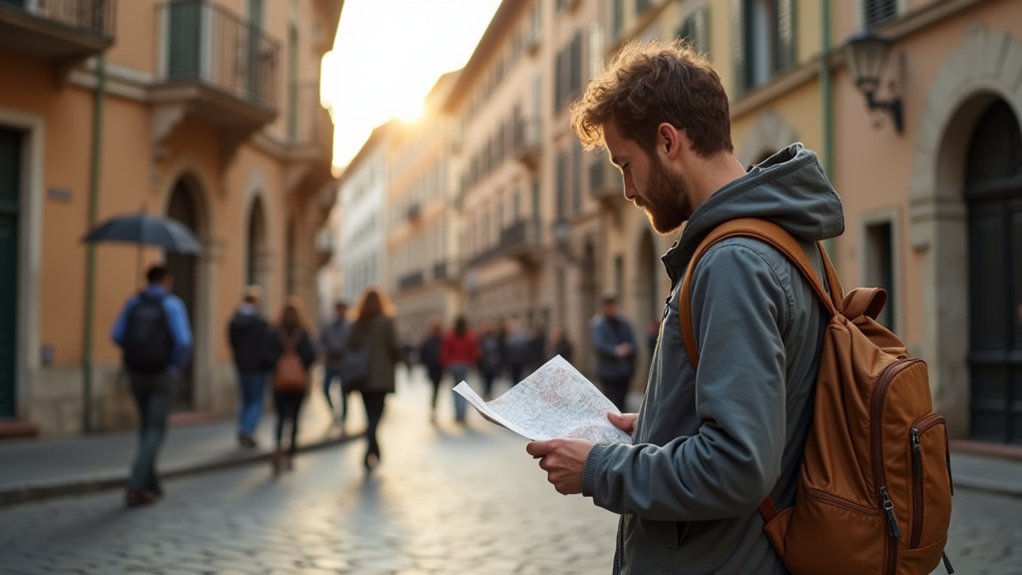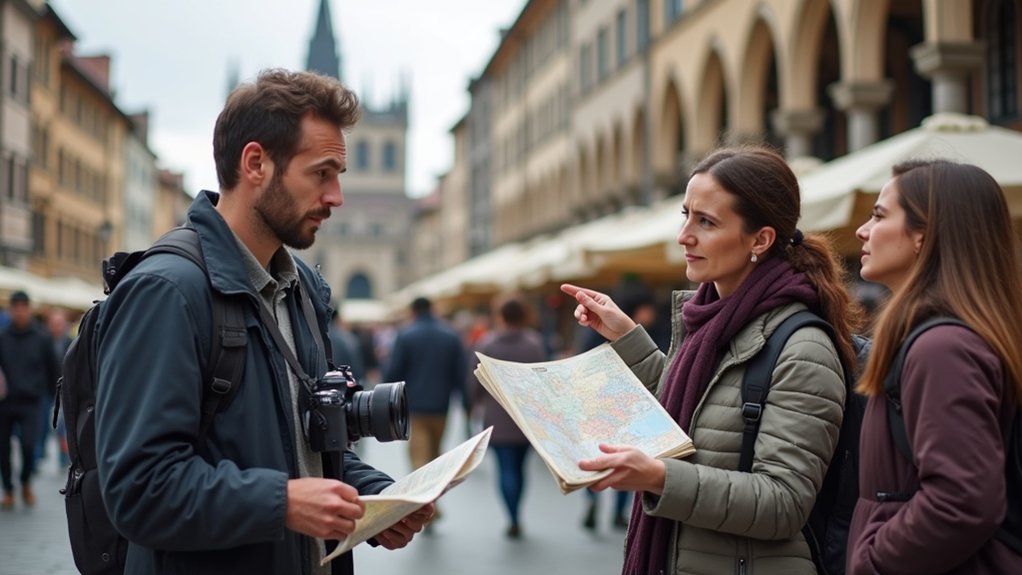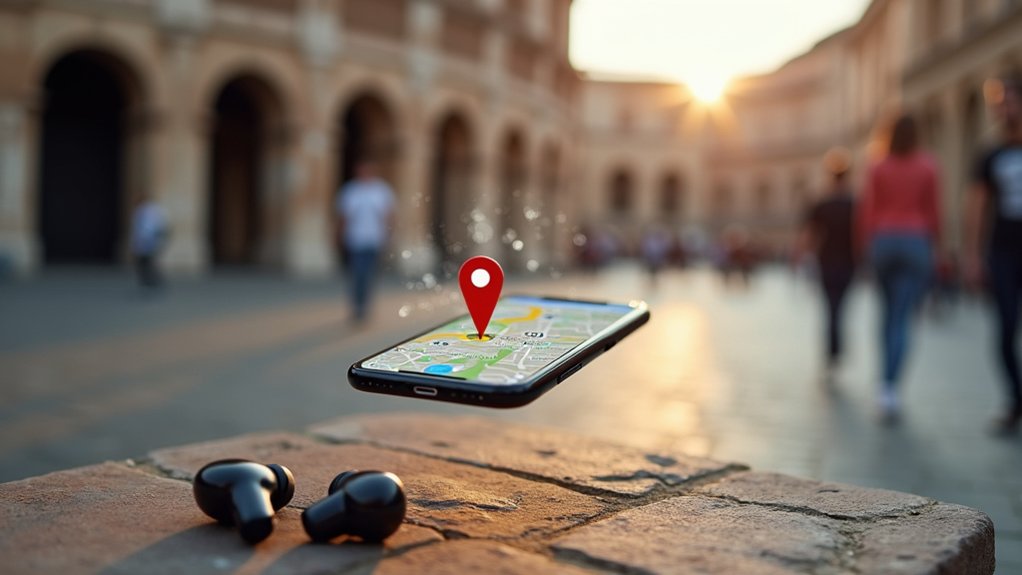You’re standing in Rome’s Colosseum, smartphone in hand, squinting at a Wikipedia article while tourists jostle past you. Sure, you’ve got the basic facts, but you’re missing the gladiator’s whispered secrets and the emperor’s hidden scandals that transform ancient stones into living history. Europe’s labyrinthine cities, complex cultural layers, and linguistic puzzles present a fascinating dilemma: can you truly access a continent’s treasures on your own, or does professional guidance hold keys you didn’t even know existed?
Key Points
- Guides save up to 30% of travel time through optimized routes and skip-the-line access in major European cities.
- Professional guidance costs €20-35 per excursion but often provides hidden savings through group discounts and avoiding costly mistakes.
- Local guides offer linguistic support across Europe’s 200+ languages and reveal cultural insights missed by independent travelers.
- Budget-friendly options include free walking tours, shoulder season discounts, and Eastern European destinations with exceptional guide value.
- Modern guide services integrate technology with AI-powered apps and 24/7 multilingual support for seamless travel experiences.
The Current State of European Tourism and Travel Complexity

While Europe’s tourism landscape has rebounded impressively from the pandemic’s grip, it’s become a considerably more complex puzzle to navigate than ever before.
You’re now competing with 125 million fellow travelers who descended upon Europe just in the first quarter of 2025—that’s 5% more visitors than pre-pandemic levels.
Europe’s tourism has surged 5% beyond pre-pandemic numbers, with 125 million travelers flooding the continent in early 2025 alone.
Spain alone hosts one in four foreign overnight stays in the EU, making popular destinations feel like bustling ant colonies.
Meanwhile, hidden gems like Lithuania and Malta are experiencing explosive growth rates of 21% and 19% respectively, as savvy travelers hunt for value amid rising costs. High travel costs are already deterring some international tourists and creating additional pressure on trip planning budgets.
With shifting holiday calendars, geopolitical pressures, and everyone seeking that Instagram-worthy spot, today’s European adventure requires serious strategic planning.
How Guides Navigate Europe’s Multi-Destination Landscape
Envision this chaotic scene: you’re juggling train schedules between Prague and Vienna, Google Translate is failing spectacularly with a Hungarian menu, and you’ve just realized your carefully planned route requires backtracking through three countries because you didn’t account for Sunday transport schedules.
Here’s where professional guides shine brightest—they’re masters of European logistics wizardry.
Your guide optimizes routes across multiple destinations, reducing travel time while avoiding congested paths. They coordinate seamless connections between air, rail, and road transport, leveraging insider knowledge to minimize backtracking and maximize sightseeing opportunities.
Using digital navigation tools and local contacts, they navigate regional networks efficiently while managing bookings and scheduling. Professional guides also utilize real-time congestion data from applications like Waze and Google Maps to enhance journey optimization through crowd-sourced information. Most importantly, they act as linguistic bridges across Europe’s 200+ languages, decode cultural nuances, and provide real-time translation assistance.
In cities like Prague, guides can arrange unforgettable experiences that showcase the best local attractions while seamlessly integrating them into your broader European itinerary.
Budget Considerations and Value of Professional Guidance

When you’re planning your European adventure, the guide-versus-independent debate often boils down to one vital question: will the extra cost deliver enough value to justify the expense?
You’ll discover that professional guidance typically adds €20–35 per excursion to your budget, but it can reveal hidden savings through skip-the-line access, group discounts, and insider knowledge that helps you avoid costly tourist traps.
The smart approach isn’t choosing between expensive private tours and going completely solo—it’s discovering budget-friendly options like group tours, strategic guide usage for complex cities, and hybrid approaches that maximize your euros while enriching your experience. For perspective, mid-range travelers typically budget around €75 daily for European destinations, which allows flexibility to incorporate guided experiences without breaking your overall travel budget.
Cost Vs Experience Value
Before you dismiss hiring a professional guide as an unnecessary expense, consider that this decision involves more than simple arithmetic—it’s about weighing immediate costs against long-term value and experience quality.
While you’ll pay $50-150 for half-day tours, you’re receiving expert commentary that transforms ordinary sightseeing into profound cultural understanding. Professional guides don’t just recite facts—they reveal historical narratives, artistic significance, and local secrets you’d never discover independently.
Yes, guides reduce spontaneity and require advance payment, but they also eliminate costly mistakes like transportation errors or missing discount opportunities.
You’ll bypass lengthy queues, access insider knowledge, and often receive consolidated pricing that includes entrance fees and transport. With destinations like Switzerland requiring weekly budgets of $2,513, professional guidance can help optimize your spending across accommodation, food, and transport costs.
Studies consistently show guided travelers report higher satisfaction levels, suggesting the enhanced experience often justifies the upfront investment for culturally-minded explorers.
Budget-Friendly Guide Options
Although professional guides offer immense value, you don’t need to break the bank to access quality guidance during your European adventure. Smart budget travelers can maximize savings by traveling during shoulder seasons when professional guides often offer discounts alongside reduced accommodation and transportation costs.
Eastern European destinations like Serbia provide exceptional value, with hostels around $5 per night, making guided experiences more affordable within your overall budget.
Consider staying outside major tourist centers where accommodation costs plummet, then use efficient train systems to access guided tours in city centers. Off-peak winter months in cities like Prague and Budapest offer the best deals on both lodging and professional services.
Planning visits around local festivals during quieter seasons combines cultural richness with budget-friendly prices, though early booking remains essential for securing discounted guided experiences. Many European cities offer free walking tours that provide excellent introductions to local history and culture without straining your daily budget.
Hidden Savings Through Guidance
While the upfront cost of hiring a professional guide might seem like an added expense, you’ll often discover that expert local knowledge actually puts more money back in your pocket throughout your European journey.
Your guide’s insider knowledge helps you sidestep overpriced tourist traps and discover authentic local gems that won’t drain your wallet. They’ll navigate you toward legitimate vendors, reveal ideal timing for attractions to avoid surcharges, and share access to group discounts unavailable to solo travelers. Experienced guides can also direct you to monthly rental opportunities for extended stays, which offer significant savings of 20-70% compared to nightly rates.
- Avoid costly tourist traps through local insights on authentic, reasonably-priced restaurants and shops
- Access exclusive group discounts on attractions, transportation passes, and bundled tour packages
- Prevent expensive mistakes like taxi scams, hidden fees, and peak-hour surcharges
Smart guidance transforms potential budget pitfalls into strategic savings opportunities.
Overcoming Language Barriers and Cultural Nuances

When you step off the plane in Prague or stroll through a bustling Parisian market, you’re immediately confronted with a reality that no travel app can fully prepare you for: the intricate dance of language barriers and cultural nuances that can transform your European adventure into either a delightful discovery or a frustrating puzzle.
Here’s where a guide becomes invaluable. They’ll navigate slang and idiomatic expressions that leave you scratching your head, while teaching you essential politeness phrases like “Bitte” in German that facilitate warmer interactions.
Your guide knows when to say “holiday” instead of “vacation,” preventing those awkward blank stares. Beyond vocabulary, they’ll help you avoid cultural missteps and guarantee clear communication in restaurants, shops, and transportation hubs, transforming potential embarrassment into confident exploration. With the UK tourism industry facing a language skills gap, having a knowledgeable guide becomes even more crucial for ensuring quality service and meaningful cultural exchanges during your European travels.
Supporting Local Economies and Sustainable Travel Practices
Because your travel dollars possess the power to either strengthen or strain European communities, choosing a local guide transforms you from a passive tourist into an active participant in sustainable economic growth.
When you hire guides, you’re directly supporting small businesses and spreading tourism benefits beyond crowded hotspots to smaller, deserving destinations. Travel and tourism’s total contribution to European economies encompasses direct employment, indirect business support, and induced economic activity that ripples throughout local communities.
Your guided adventures naturally promote responsible travel practices through smaller group sizes and environmental education.
Guides steer you toward authentic local markets, traditional eateries, and hidden craftspeople, ensuring your spending enriches the cultural economy rather than generic tourist traps.
- Economic multiplier effect: Your guide fees create jobs across hospitality, transport, and artisan sectors
- Sustainable exploration: Guided tours reduce overtourism stress through controlled, educational visits
- Cultural preservation: Supporting local guides helps communities retain traditional knowledge and expertise
Technology Integration and Modern Guide Services

You’ll discover that modern European travel has embraced a digital revolution, where smartphone apps now serve as your pocket-sized tour guide, complete with GPS navigation, multilingual audio commentary, and augmented reality features that bring ancient ruins to life before your eyes.
The European Union’s integrated travel systems work seamlessly with these digital platforms, allowing you to book guides, access cultural sites, and even handle contactless payments across multiple countries with surprising ease.
Virtual assistant technology has transformed the traditional guide experience, offering AI-powered chatbots that can answer your questions about local customs, suggest personalized itineraries based on your interests, and even help you navigate language barriers when you’re standing in a bustling Roman piazza at midnight. These digital tools are particularly valuable given the growing popularity of off-season travel, which has driven significant increases in tourist numbers to destinations like Cyprus and Malta in early 2025.
Digital Guide Apps
As Europe leads the global travel planner app market with a commanding 38.5% revenue share, digital guide apps have transformed from simple map replacements into sophisticated travel companions that rival traditional human guides.
You’ll find these apps increasingly intelligent, with AI-powered features that solve real travel pain points rather than just creating flashy gimmicks. While less than 10% of European travelers currently use generative AI for trip planning, 97.8% of travel executives predict AI will revolutionize the industry within five years.
Modern digital guides offer compelling advantages:
- Real-time updates and interactive maps that adapt to your location and preferences instantly
- AI chatbots and personalized recommendations tailored to your travel style and budget
- Seamless integration with booking platforms, making planning lightning-fast for the 53% prioritizing speed
With 48% of travelers already using mobile devices for destination research, you’re joining a tech-savvy majority. The growing influence of social media platforms on travel decisions creates new opportunities for digital guides to integrate inspiration directly with practical planning tools.
EU Travel Integration
While digital apps grab headlines, Europe’s real travel revolution lies in its unprecedented physical integration—a seamless web of cross-border infrastructure that transforms how you experience guided tours and services across the continent.
You’ll breeze through 26 Schengen countries without passport checks, while your Eurail pass whisks you between nations effortlessly.
Smart Tourism Destinations now use IoT sensors to manage crowds, and contactless payments work everywhere—no more fumbling with foreign currency during that castle tour.
Professional guide associations coordinate training standards across borders, ensuring your multilingual guide in Prague meets the same quality as Barcelona’s. With projected expenditure rising 14% in 2025, travelers are increasingly investing in quality guided experiences that deliver exceptional value.
Interactive kiosks provide real-time updates, while certified guides increasingly offer AR-enhanced storytelling that brings ancient ruins to life with digital magic.
Virtual Assistant Technology
Something remarkable happens when artificial intelligence meets European travel—your smartphone transforms into a polyglot concierge that never sleeps, never gets cranky, and somehow remembers that you’re lactose intolerant while suggesting the perfect gelato alternative in Rome.
Europe’s virtual travel assistant market is exploding, projected to hit €15 billion by 2027. These AI-powered companions handle everything from booking modifications to real-time itinerary adjustments, operating seamlessly across multiple languages—crucial when you’re traversing Prague’s winding streets or deciphering Parisian metro announcements. Over 45% of these digital assistants now leverage AI tools for enhanced data processing, scheduling optimization, and personalized customer service interactions.
- 24/7 multilingual support eliminates language barriers across diverse European destinations
- Instant personalized recommendations adapt to your preferences and dietary restrictions
- Cost-effective scalability provides premium concierge services without premium prices
Travel agencies now rely heavily on these digital guides, with chatbots dominating 72% of the market, offering immediate responses to your midnight travel anxieties.
Making the Decision: When Guides Add the Most Value

When should you invest in a guide during your European adventure? Consider hiring one when you’re tackling major cities like Rome or Paris, where guides save up to 30% of your time through optimized routes and skip-the-line access.
They’re invaluable when time’s limited—no more frantically Googling opening hours or missing hidden gems because you took a wrong turn.
Guides shine brightest in complex historical sites, transforming dusty museum artifacts into enthralling stories that’ll stick with you long after vacation photos fade.
If you’re venturing off-the-beaten-path or facing language barriers, local expertise becomes your lifeline. They’ll navigate cultural nuances, provide safety insights, and reveal authentic experiences that independent travel often misses. With emerging destinations like Serbia and Bulgaria seeing dramatic visitor increases, guides become even more essential for navigating these lesser-known territories.
Take Prague, for example, where mastering the public transportation system like a local can transform your entire city experience.
Think of guides as your European GPS—but for culture, not just coordinates.
The Last Word
Coincidentally, the best European trips often happen when you’re torn between independence and guidance—then choose the guide. You’ll discover that moments you thought you’d stumble upon naturally actually require local insight to find. Your travel budget stretches further when someone prevents those expensive tourist traps, and surprisingly, you’ll feel more adventurous with expert support. Trust the coincidence: guided exploration often leads to the spontaneous discoveries you’re really seeking.

